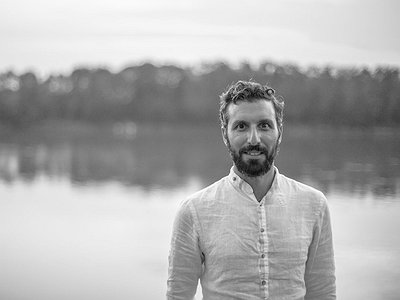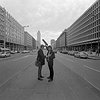Name: Giuseppe Cordaro
Nationality: Italian
Occupation: Sound artist, sound sculptor, ecologist
Recent Release: Giuseppe Cordaro teams up with Marco Giambrone for Alico, out via Fluid Audio.
Recommendations on the topic of sound:
Books: The World in Six Songs: How the Musical Brain Created Human Nature by Daniel J. Levitin; Sound: A Very Short Introduction by Mike Goldsmith; Listening to Noise and Silence: Towards a Philosophy of Sound Art by Salomé Voegelin; Silence by John Cage
Websites: Acoustic Ecology – https://www.wfae.net/; Sound Studies - - The World Listening Project - https://www.worldlisteningproject.org/
[Read our Marco Giambrone interview]
If you enjoyed this Giuseppe Cordaro interview and would like to stay up to date with his music, visit him on Instagram, Soundcloud, and twitter.
When I listen to music, I see shapes, objects and colours. What happens in your body when you're listening? Do you listen with your eyes open or closed?
When I listen to music, I often find myself deeply engaged in the auditory experience.
Sometimes, I close my eyes to better immerse myself in the music, allowing the sounds to take precedence over visual stimuli. Other times, I keep my eyes open, letting the music complement my surroundings.
How do listening with headphones and listening through a stereo system change your experience of sound and music?
I love listening to music both through excellent headphones and linear audio monitors.
Listening to music through headphones and a stereo system can offer different sonic experiences. Headphones provide a more intimate and direct connection to the music, while a stereo system can create a sense of space and depth, filling the room with sound.
I don't have a specific preference; I like to enjoy the sound in any aspect of it.
Tell me about some of the albums or artists that you love specifically for their sound, please.
Since childhood, I've been fortunate to have parents who love music, and I've listened to vinyl and cassettes with them.
Some albums and artists I admire for their sound include Radiohead's Kid A for its experimental textures and haunting melodies …
… Miles Davis' Kind of Blue for its timeless elegance and improvisational spirit …
… and David Sylvian's Blemish for its ethereal atmosphere and emotive voice.
Do you experience strong emotional responses towards certain sounds? If so, what kind of sounds are these and do you have an explanation about the reasons for these responses?
I do experience strong emotional responses to certain sounds, particularly those with personal significance or resonance.
For example, low sounds around 50Hz to 250Hz resonate with me, perhaps because they evoke the fetal state of amniotic fluid. I've even recorded amniotic sounds for a project in the past.
Another example is the sound of rain tapping against a window, which evokes feelings of comfort and nostalgia. I love active listening in all its forms.
There can be sounds which feel highly irritating to us and then there are others we could gladly listen to for hours. Do you have examples for either one or both of these?
Everything around us acoustically has intriguing aspects; what may be noise to some, others find soothing. Personally, I've always been fascinated by sounds of the earth, whether human-made or not.
In 2010 with sound artist Giorgio Sancristoforo, we created a sound installation called "Audioscan Milano" that exploited the noises of the city. At the basis of audioscan there are 1.580 recordings and phonometric surveys gathered within the perimeter contained in the main ring road of Milano. 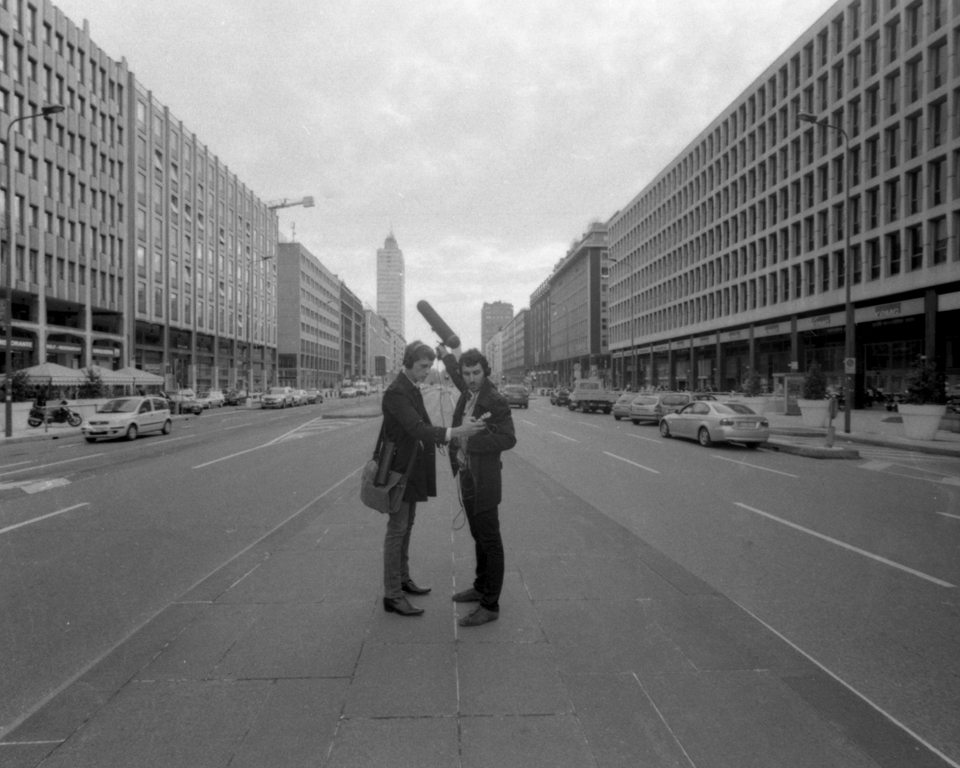
Audioscan Milano Image by Angelo Ferrillo
Audioscan puts itself up as a chance to reflect on the features of the sound surrounding us and the spaces we act in. A process of meeting and exchange between contemporary art, music and environmental themes, a meditation on soundscape and the auditive dimension of human experience, both on an aesthetic and a social perspective.
An ambitious cataloguing work and an environmental awakening project through the transformation of a waste product of technological society – noise – into an artwork. More information here. 
Giuseppe Cordaro Interview Image (c) the artist
Are there everyday places, spaces, or devices which intrigue you by the way they sound? Which are these?
Everyday places and devices such as bustling city streets, quiet parks, or vintage record players intrigue me with their unique sonic signatures.
Each environment offers its own palette of sounds that shape our auditory experiences.
Have you ever been in spaces with extreme sonic characteristics, such as anechoic chambers or caves? What was the experience like?
I've visited spaces with extreme sound characteristics, such as music chambers and natural caves or volcanic craters. The experience was surreal and enlightening, heightening my awareness of sound and challenging my perception of space and silence.
One of the spaces I'm most attached to is the concert hall of IRCAM in Paris, a truly magical place, and the Alpine lake of Braies, where you can hear crackling sounds resembling lightsabers from Star Wars under certain temperature conditions.
What are among your favourite spaces to record and play your music?
Some of my favorite spaces to record and play music include natural settings like forests or beaches, as well as acoustically rich environments like concert halls or recording studios. I love my home studio because it gives me the right feeling to sculpt new sounds.
Each space offers its own acoustic properties that influence the sound and atmosphere of the music.
Do music and sound feel “material” to you? Does working with sound feel like you're sculpting or shaping something?
Music and sound feel inherently "material" to me, as they can be shaped, sculpted, and manipulated to create dynamic compositions and sonic landscapes.
Working with sound often feels like molding clay or painting a canvas, with each element contributing to the overall texture and mood of the piece.
How important is sound for our overall well-being and in how far do you feel the "acoustic health" of a society or environment is reflective of its overall health?
Sound plays a vital role in our overall well-being, influencing our mood, cognition, and sense of connection to the world around us.
The acoustic health of a society or environment reflects its overall vitality and livability, highlighting the importance of preserving and cultivating our natural sonic environments.
Sound, song, and rhythm are all around us, from animal noises to the waves of the ocean. What, if any, are some of the most moving experiences you've had with these non-human-made sounds?
Among the most poignant experiences I've had with non-human-made sounds is listening to the summit craters of Etna volcano.
I am fascinated by volcanoes and have made recordings and installations for the two main active volcanoes in Sicily, Etna, and Stromboli. Like the ancient philosopher Empedocles, I also remain hypnotized by the ancestral and powerful sounds of volcanoes.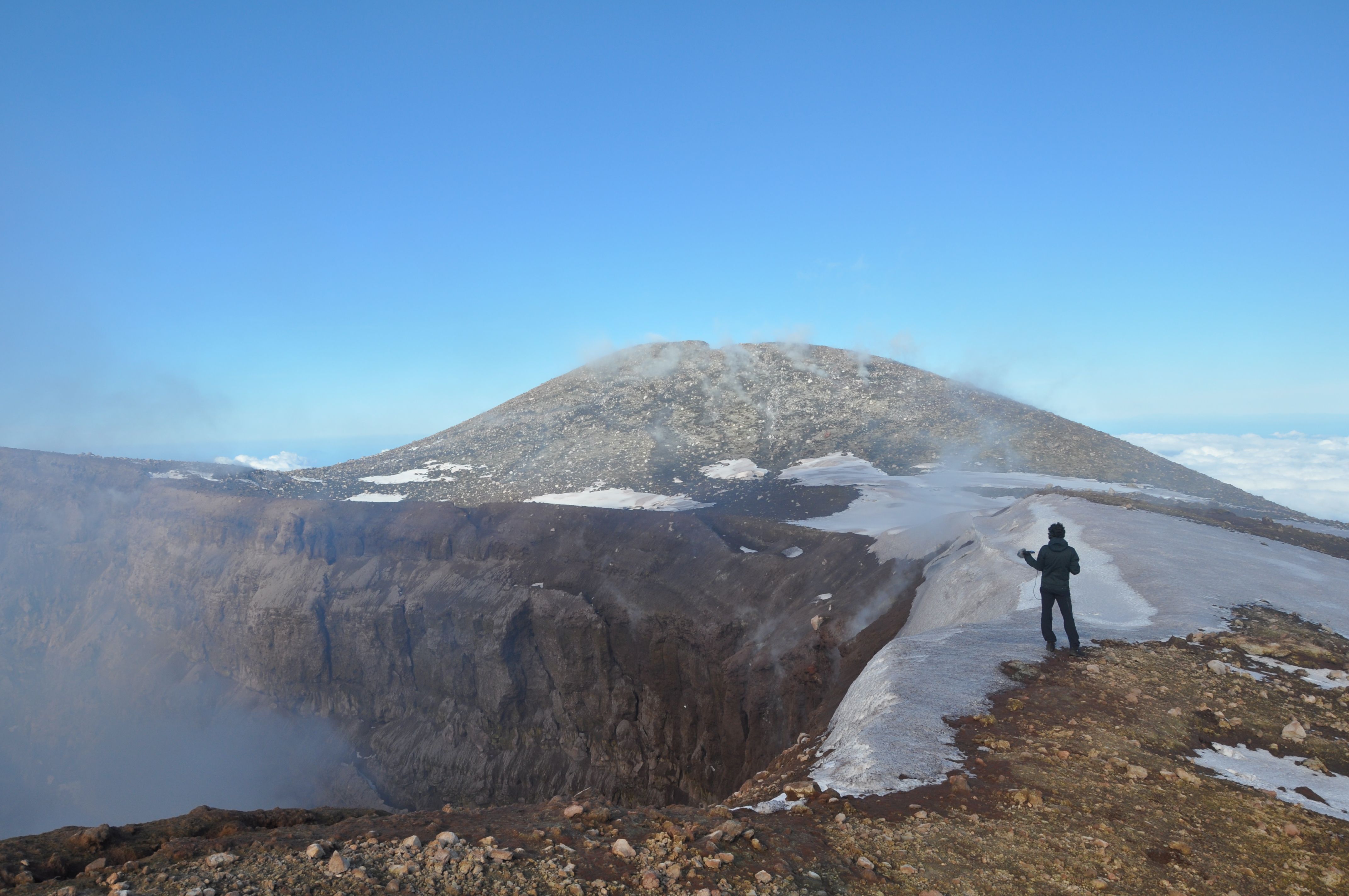
Photo by Elena Mazzi
Many animals communicate through sound. Based either on experience or intuition, do you feel as though interspecies communication is possible and important? Is there a creative element to it, would you say?
Interspecies communication is indeed possible and important, as many animals use sound to convey information, express emotions, and establish social bonds.
There is a creative element to interspecies communication, as it requires empathy, observation, and a willingness to listen and respond to the unique languages of other species.
Think about plants and how they are able to transmit information through their roots; it is a magnificent aspect that I often use in my performances and sound installations.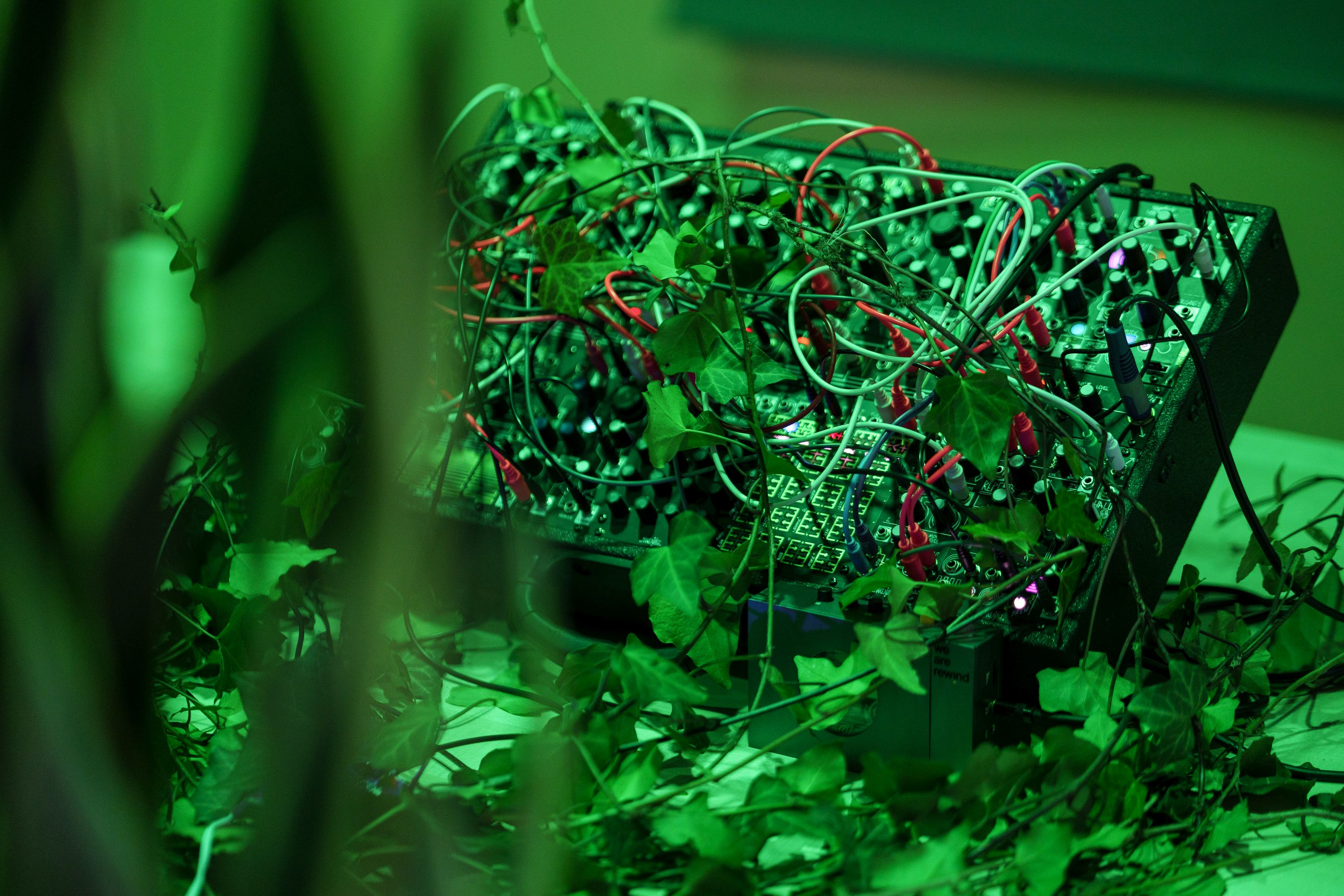
The MakeNoise Shared System used for the plant performance; Photo by by Matteo Luppi and Francesca Goldoni
Tinnitus and developing hyperacusis are very real risks for anyone working with sound. Do you take precautions in this regard and if you're suffering from these or similar issues – how do you cope with them?
Precautions against tinnitus and hyperacusis are truly important aspects for a musician. Fortunately, to date, I have never suffered from these problems.
If problems arise, it is essential to seek professional advice.
We can surround us with sound every second of the day. The great pianist Glenn Gould even considered this the ultimate delight. How do you see that yourself and what importance does silence hold?
As an artist deeply immersed in the exploration of sound, I perceive the constant presence of sound as an invitation to engage with the world profoundly. Sound surrounds us like an ever-shifting tapestry, offering endless opportunities for discovery and connection.
However, amidst this abundance of sound, silence holds a special significance. Silence is not merely the absence of sound but rather a space pregnant with potential, a canvas upon which sound can unfold and be appreciated fully.
In essence, while sound enriches our lives with its vibrancy and diversity, silence provides the necessary contrast and depth, grounding us in the present moment and reminding us of the beauty of simply being.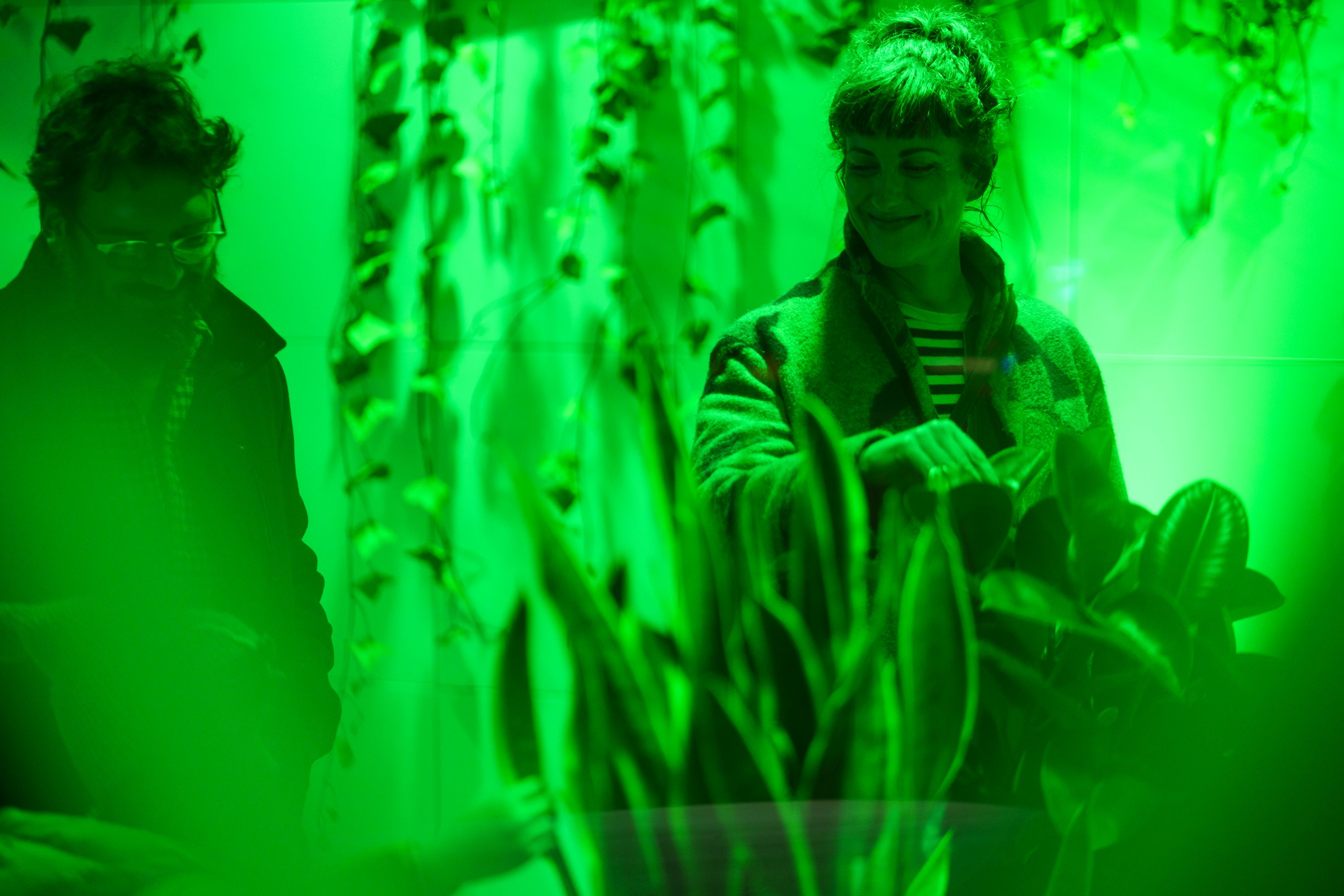
Visitors of the plant performance; Photo by by Matteo Luppi and Francesca Goldoni
Seth S. Horowitz called hearing the “universal sense” and emphasised that it was more precise and faster than any of our other senses, including vision. How would our world be different if we paid less attention to looks and listened more instead?
If we were to shift our focus from sight to listening, embracing sound as the primary mode of perception, our world would undoubtedly undergo profound transformations.
Seth S. Horowitz's characterization of hearing as the "universal sense" underscores the intrinsic power and immediacy of sound in shaping our experiences and understanding of the world. In a society that prioritizes listening over looking, our interactions and relationships would likely deepen, as we become more attuned to the nuances of voice, tone, and intonation.
Communication would transcend mere words, as we learn to discern meaning and emotion from the subtle variations in sound. Our appreciation for the natural world would also expand, as we immerse ourselves in the symphony of sounds that surrounds us. Moreover, by privileging listening as a mode of perception, we may foster greater empathy and understanding among individuals and communities.
By actively listening to one another's stories and experiences, we bridge divides and cultivate a shared sense of humanity.



